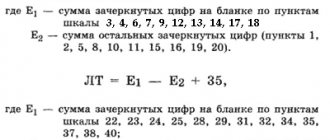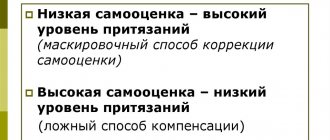Myers-Briggs MBTI Typology Myers-Briggs Type Indicator is a personality typology created by Katherine Cook Briggs and her daughter Isabel Briggs Myers based on their work with Carl Jung's theory of psychological personality types.
Jung proposed that people perceive the world through four basic psychological functions (Thinking [T], Feeling [F], Sensing [S], Intuition [N]), each of which has one of two polar orientations (Extroversion [E] or introversion [I]), and that one of these four functions is dominant most of the time.
Theory of psychological personality types
Based on their ability to think and act in socionics, all people were divided into groups. Personality types were developed by Isabel Myers and Katherine Briggs.
Their theory, based on the research of Carl Jung, expands on the psychologist's ideas and creates a complete structure of species.
Myers and Briggs proposed four basic characteristics that are used to classify personality type:
- Extraversion and introversion (energy management). Introverts prefer to be alone for a long time, are reserved, and thoughtful. Extroverts enjoy lively, fun environments and are expressive and outspoken.
- Perception and intuition (information processing). Sensory learners focus on the five senses and are interested in what they see, hear, and feel. Intuitive people use abstract thinking, theories, patterns. They are more concerned about the future than the present moment.
- Thinking and feeling (decision making). Thinkers choose with their heads, rely on logic and reason. Sensitive people decide with their hearts and are interested in how it will affect others.
- Judgment and perception (organization of life). Those who are inclined to have their own opinion, advocate order, planning, and do not like change. Perceiving people are flexible, spontaneous, ready to change their mind at any moment, and easily adapt to the situation.
Take an online test of 20 questions
The Myers-Briggs test, along with many other tests popular in world practice, is included in the “Self-Knowledge” course. After completing it, you can get a detailed description of your personality, strengths and weaknesses, and inclinations in order to better understand yourself and use this knowledge for self-development.
The test below will determine which “pole” for each dichotomy a person is more inclined to. The test contains 20 questions: 5 questions for each descriptor. It is an odd number of questions for each scale that makes it possible to get your inclination towards one or another pole (an even number would make it possible to get an intermediate result: 50 to 50).
Before starting the test, it is important to understand the following things:
- No questions in any questionnaire, even the most detailed, can cover all of a person’s behavior. This test allows only to “outline the framework” and indicates a bias, and not the comprehensive dominance of some properties over others.
- Regardless of belonging to any type, each person uses both poles of preferences in everyday life, but to varying degrees. For example, we can be sociable with good friends, but more often we are introverts.
- When answering a question, choose the option that seems most preferable and comfortable for you in most life situations. If you don't like both options, then choose the least unattractive option.
- By taking the test, you will not only find out your personality type, but also receive a short explanation of the result. Don't forget to answer all the questions; it's best to go in order.
We will be glad if you indicate your personality type in the comments and tell us your opinion and impressions about the test. Also pay attention to our training in psychology, as well as the MBTI test to determine the type of creativity.
Analyst
The personality types of this group are distinguished by a sharp mind, logical thinking, the ability to highlight the main thing, fairness and objectivity. It includes strategists, logicians, commanders and debaters. Such subtypes have sharp judgments and principled assessments. If these people are not satisfied with the rules, they are ignored.
Strategist (architect)
Such a person is rare. He has a wonderful imagination, thinking, and indomitable mind. This type is decisive, prone to ambition, does not waste energy, and values his own individuality. A strategist is a cynical idealist who is confident that he will achieve what he wants, does not accept rules or restrictions, and acts according to principles. He is proactive, does not wait to be asked, to explain what to do.
Logician
An educated person who considers himself exceptional, smart and proud of it. This type loves to unravel complex problems and looks for inconsistencies in proven facts. A person is not interested in everyday life, he completely surrenders to situations where he realizes himself. This type is constantly thinking, therefore thoughtful, shy, but changes dramatically during a discussion or argument.
Commanding
This is a charismatic and self-confident leader who easily gathers crowds of attentive listeners and zealous followers, although he talks about ordinary, inconspicuous things. The commander is a dominant person who insists and forces people to accept their point of view.
Wrangler
A thinker who is constantly busy training his sparkling mind. This type is honest, argues tirelessly, and defends an idea even when he doesn’t believe in it. A person studies the subject inside and out so that the opponent has no chances or questions.
Complete list of 2 species and 16 subspecies
Extrovert
1.Logical-sensory (LSE)
An able-bodied person who knows how to be part of a team and is able to do work together. He plans his activities and always carries them through to the end, despite the difficulties. Can be overly direct, which makes him seem harsh and easily hurt others. He is open and sociable, cares and values his family. The energy, as they say, is “boiling,” so he makes an excellent leader who knows how to motivate employees to achieve and inspires action with his example. Loves noisy companies and parties.
2.Logical-intuitive (LIE)
Prefers active, dynamic and extreme sports. The character is sociable, he looks at the world positively and optimistically. He has a very valuable skill - to determine his capabilities and relate them to reality. In his actions he relies on intuition, he is risky and easy-going, he is very easy to inspire and motivate. She uses modern technologies in her work, as she is always up to date with new products. To develop, he constantly analyzes his actions and mistakes.
3. Ethical-sensory (ESE)
A versatile personality, active and sociable. But at the same time, he is an excellent manipulator; no matter what kind of relationship there is, it is easier and more important for him not to ask, for example, but to manipulate, “push.” He needs recognition and praise, and has the right to it, since he is independent and knows how to achieve success on his own, without enlisting the support of anyone. Capable of sacrificing his own ambitions and interests for the benefit of another person.
4.Ethical-intuitive (EIE)
Excessively emotional, so much so that even gestures and facial expressions are very expressive, sometimes harsh. Emotionality helps them understand the feelings of other people, this ability is called empathy. And thanks to empathy, they recognize lies, insincerity and easily notice inconsistencies between words. Also, trusting their intuition and feelings, they sometimes anticipate some events for which they boldly prepare later. They know how to support, sympathize and just be there. They have difficulties with trust and are extremely jealous.
5.Sensory-logical (SLE)
They make excellent athletes because they achieve success because of their need to win. It is simply their meaning and purpose in life. Even mundane tasks are analyzed for gain and benefit, competed and rivaled. But at the same time, if such a person has planned something, he will not rest until he implements it, and will not retreat from any obstacles; in extreme cases, he will even use force or cunning in order to realize his plans. It is very uncomfortable and unbearable when you find yourself in conditions where you have to obey.
6.Sensory-ethical (SEE)
Like many extroverts, he tries to lead in relationships rather than obey, so he initially chooses people who are weaker than himself, or who have the opposite need - to be led so that the other is responsible. He uses manipulation techniques to satisfy personal interests and most often presents to the world some qualities that, in fact, he does not possess, again to create an image in order to fulfill his needs.
7. Intuitive-logical (ILE)
He adapts well to changes because he avoids the feeling of routine and everyday life, and he himself is very unstable, as a result of which he often changes conditions in life. Coziness and a feeling of comfort are important. It takes a long time to make a decision until he is convinced of its correctness, having weighed all the pros and cons. Such individuals are essentially just a storehouse of ideas that flow from them in a stream, and at the same time they can clearly explain even the most difficult moments.
8. Intuitive-ethical (IEE)
They are born dreamers and creative people. They are easily offended or hurt because they are very sensitive, so they avoid tense and conflict situations. Routine for them is like death, and to avoid it, they look for entertainment and socialize a lot. They have a great sense of humor and attract cheerful people into their lives who know how to rejoice and enjoy life. They are responsive, and if there is no way to do something, they will at least help with advice.
Introvert
9.Logical-sensory (LSI)
Such a definition as an introvert already speaks for itself, so it is not surprising that this type of people has a pedantic character. Order and clarity, above all. Prefers privacy and a narrow circle of friends. Will start doing work if he is confident that he will do it perfectly. Those around him trust him, feeling reliable and due to perfectionism. He doesn’t have his head in the clouds, but looks at life and its realities soberly.
10.Logical-intuitive (LII)
They like to have heart-to-heart conversations and philosophize, only in a very narrow circle of close people. They are calm and balanced, but when meeting people they may have difficulty communicating; for them this is unbearable in terms of their level of anxiety. They prefer to demonstrate their independence to others. At their core, they are practical people, but when they don’t find a logical explanation for something, they rely on their intuition.
11. Ethical-sensory (ESI)
A fighter for equality, he will defend his principles and views to the last. He often analyzes his mistakes and finds fault with his personality. Aware, which helps him notice the insincerity and falsehood of other people. Loyal, always ready to stand up for his loved ones, even if the battle is unequal.
12. Ethical-intuitive (EII)
They make excellent teachers and educators because they know how to support and recognize the talents of other people, helping them develop. They love to read, study and generally engage in self-development. There is a need for intimacy, trust and love, and sometimes it is too exposed, bringing suffering. They do not forgive betrayals, betrayals and lies in general. For them, the very concept of the word anger and aggression causes anxiety and fear, so they avoid conflict situations in every possible way.
13.Sensory-logical (SLI)
This type of person experiences the world primarily through sensations, so they choose a profession that allows them to work with their hands and use motor skills. For example, builders, engineers. They prefer to stick to the plan, bringing the job to an end and completing it on time. They don’t like to obey, and difficulties create excitement instead of resistance and a desire to give up.
14.Sensory-ethical (SEI)
A simple, open person. He loves to have fun, joke and he manages to enjoy life, even if the day is similar to another. He has altruistic characteristics, he may well work as a volunteer, participate in charity events, and even on the street he will not pass by an old woman with a heavy bag without offering his help. She values her personal space, not allowing anyone to violate it, while respecting other people’s personal boundaries.
15. Intuitive-logical (OR)
A person loves solitude to reflect, to be in silence; at such moments he recovers and gains strength. He can safely be called an erudite, as he is a “walking encyclopedia.” He is very neat and values order. In relationships, he is cautious and does not let anyone get close to him for a long time until he is convinced that he can trust him.
16. Intuitive-ethical (IEI)
These creative people simply love to dream, read or write poetry. They attach great importance to appearance and are ready to spend their last money on new clothes just to attract the attention of the opposite sex. And, by the way, they succeed very well. They love rest, to lie around and indulge in their favorite pastime - dreams and fantasies.
Diplomat
Representatives of this group are characterized by an easy-going character, calmness, balance, and a desire for harmony. It includes a mediator, a lawyer, a servant and a protagonist. All subtypes are easy to communicate, receptive, flexible, with restrained emotions. It is difficult to anger such people.
Advocate
Subtype characteristics:
- A rare intuition, it understands what is going on in the head of another, absorbs other people's emotions, and easily looks into people's future.
- Knows where to put pressure on the disputant in order to obtain agreement, sees the problem as a whole, takes into account other people's points of view.
- Suitable for personnel management because he strives to make others happy. At the same time, he forgets about himself and imitates ease.
Mediator
Type Features:
- He is creative, knows how to clearly convey ideas, motivates people to self-development and move forward.
- Instantly calculates prospects, having a minimum of information, predicts the outcome of the situation.
- Easily moves from one topic to another, understands, knows how to convey a thought to a person.
- He is talented from birth, has many hobbies, is energetic, and is devoted to his work without reserve.
- How to remove a love spell
- Royal pork - recipes step by step with photos. How to cook royally baked pork under a fur coat
- How to make pompoms from yarn quickly
Campaigner
This is an intermediary who is interested in the process, not the final result. The type adheres to moral principles, speaks competently, and is inclined to study languages. The servant concentrates on one task, does not waste effort, does not overestimate his function, otherwise he is left with nothing.
Main character
A frequent guest at parties, the leader of companies, the center of attention is a feature of this type of people. They are not attracted to routine work; self-esteem depends on independently made original decisions. They easily switch attention, know how to relax, rest, and do it with pleasure.
Feature engineering
For each token in the feature engineering sample, we calculate the following characteristics
- how many times the token was encountered (total_number);
- how many times the token was encountered, provided that the user belongs to a positive class (true_number);
- how many times the token was encountered, provided that the user belongs to a negative class (false_number);
Next, we calculate the distributed grade (dg) metric for each token. We select twenty tokens with the highest value of this metric for each class. As a result, we get forty features. Feature values are conditional probabilities of a token belonging to a class: true_number to total_number and false_number to total_number.
Sentinel (guardian)
People included in this group divide everyone into strangers and their own. Its representatives - a logistician, a defender, an official and a consul - are rarely ready to compromise with outsiders; they forgive friends everything and protect them from negativity. These psychotypes calmly accept problems, troubles, and feel sorry for the sick, weak, and disadvantaged. If they decide to teach the offender a lesson, they methodically increase pressure on him.
Logistician
Features of the subtype:
- Strictly follows accepted rules and performs duties perfectly.
- He is proud of the work he has done, is guided by facts, and is not obsessed with emotions.
- He is self-sufficient in all situations and will not complain – he considers this a weakness.
- It is difficult to refuse requests, and people take advantage of this.
Defender
Characteristics of a person who consists of contradictions:
- Strives for stability and security, but does not resist change.
- Mostly secretive, silent, but easily fits into the company.
- A true altruist gives himself completely in exchange for gratitude.
- Although he is careful and pedantic in his affairs, fulfills his obligations on time, he often puts off his plans.
Executive
An honest, purposeful manager is a vivid example of the fact that with hard, constant work you can achieve your dreams. The person is a team player and expects real help and effective support. Gets angry when employees don't meet their professional standards. Such an employee is a godsend for the enterprise. An integral personality preserves traditions, fulfills labor standards and norms, and is dedicated to the work.
Consul
For such a person, social status is important, so he is always in the center of the team, listens carefully to people, and delves into the conversation. He loves when he is appreciated, needs his presence, and is sincerely thanked. In such relationships, he becomes an altruist who is obliging, caring, and always ready to help. The situation concerns work, finances or personal problems.
Characteristics of the resulting classifiers
For classification, we used the Gradient Boosting Classifier from the scikit-learn library.
To assess the quality of the classifiers, we analyzed the area under the ROC curve. ROC curve is a graphical characteristic of the quality of a binary classifier. The curve reflects the dependence of TPR (true positive rate) on FPR (false positive rate). where TP is true positive, FP is false positive, FN is false negative, TN is true negative.
The area under the ROC curve AUC (Area Under Curve) is a characteristic of classification quality: the higher the AUC value, the better the classification model.
In the process of selecting parameters, we managed to increase this metric from 0.63 to 0.77, using a lattice search for the parameters n_estimators (number of trees) and max_depth (depth of trees).
Table 1 shows the final values of the area under the ROC curve for each classifier. And in the figure below the ROC curves themselves are plotted. Table 1: Areas under the ROC curve of classifiers
| EI classifier | 0.763 |
| SN classifier | 0.793 |
| TF classifier | 0.768 |
| JP classifier | 0.768 |
Guides (seekers)
These are free artists who take pleasure in destroying traditions with creative attempts and impulses. The group includes virtuosos, adventurers, entrepreneurs and entertainers. These psychotypes offer unexpected options and generate ideas. They often exhibit strange, laid-back behavior, which is normal for them. It is difficult for them to complete a task during the working day; it is better to give them freedom and allow an individual schedule.
Virtuoso
This is a person who is busy with creativity and has the following characteristics:
- He explores the world with curiosity, is rational and enthusiastic.
- He happily helps others, shares his own experience, and constantly strives to improve life.
- Often mysterious.
- Friendly, but closed, outwardly calm, but restless.
- Makes decisions based on practical experience.
- A brave innovator, he knows a lot and can do it.
Adventurer
Portrait of a psychotype:
- An artist who experiments with appearance and behavior destroys generally accepted traditions and foundations.
- An introvert, he spends periods of solitude on introspection. Often reconsiders his views on life, relationships with loved ones, his place in the world, and his own values.
- He is sensitive to people and feelings.
- He doesn’t look into the future, doesn’t make plans, lives today, at a specific moment.
- Flexible, creative, enthusiastically takes on new projects and tasks. At such a moment, many productive ideas are generated.
Entrepreneur
A successful businessman who is comfortable in the spotlight has the following characteristics:
- He discusses current topics with pleasure, does not plan anything, does everything at once, corrects shortcomings and mistakes right on the go.
- He likes to take risks, has difficulty adapting to society, prefers a free life, working outside of the schedule. It is useless to force such a person into a rigid framework - he quickly loses interest and falls into apathy.
- Under comfortable conditions, an energetic, receptive employee who takes risks if the project fails.
- He has an expressive disposition, but is right in 99% of situations.
Entertainer
Such a person is constantly happy, lives in the moment, his distinctive features are:
- Aesthetically developed, observant, attentive to others, supportive, helpful.
- Avoids conflicts, resolves everything peacefully.
- Prefers luxurious things and often lives beyond his means.
- He doesn't like to plan, so he often loses what he has.
- There is never a dull moment with him – he lifts your spirits and gives you ideas on how to resolve the situation or get out of it.
A little about the history of its origin
It came about through the collaboration of Katarina Briggs and Isabella Myers-Briggs, mother and daughter. These beautiful and intelligent women took the ideas of Carl Gustav Jung as the basis for their typology; we talked about them in the article about 16 types of temperament. If you don’t remember, it’s best to re-read it for a better understanding of the entire system. So, now it is called MBTI (Myers-Briggs Type Indicator), and indicators are taken into account even when applying for a job; the applicant must include his result in his resume.
And in Japan and other developed countries they name the type of affiliation almost during ordinary acquaintance, since no one needs to decipher it, knowledge about all types is almost the basic information that a person living in society and wishing to cooperate with others should possess people.
Optimists, pessimists and realists
- Lyokha, well, how much longer do I have to read?
Now let's move on to classifying people into optimists, pessimists and realists.
Optimists
There are 3 types of optimists.
Complete optimist
In a good sense of the word, the main principle of his life is to think positively, no matter what.
Pessimists
Pessimists are divided into 2 types.
Pessimist from birth
Looks askance at everyone who thinks positively. From birth he has a grumpy character. He makes dark jokes and assumes the worst.
In another way, he can be called a skeptic.
Realists
The realist is the only sober person in the whole trio. He analyzes the situation and only after that decides whether it is good or bad. There are 2 types of realists.
The realist is false
A pessimist who hates other pessimists and hides under the guise of a realist. It is easy to distinguish him from a true realist - a false realist is vulnerable and does not know how to control himself.
Why is socionics needed?
The concept of socionics helps to better understand yourself and others, productively solve personal and professional problems, discover true talents and realize yourself in the right direction. Basic knowledge of personality prototypes also allows you to find common ground in controversial issues between family, friends, and strangers, and to accept your opponent’s worldview.
Interesting. If you correctly determine the sociotypes of people, it will not be difficult to predict their behavior in certain situations. Understanding the characteristics of sociotypes simplifies the selection of work teams. For individual tasks, it is worth selecting a candidate who can cope in the best possible way.
Psychogeometry
American psychologist Dillinger proposed dividing psychotypes based on psychogeometry. In her opinion, each person can be associated with a certain geometric figure. As with other classifications, mixed types are most common, however, one will still be predominant.
Now you know how to find out your personality type. Choose the classification that interests you most. You can also determine your psychotype in each option. Remember that there are no pure types, just one that is dominant.
Formation of names
How did socionics get its name from specific personality types?
The name of the type comes from the dominant attitude (extroversion or introversion), and the two most powerful functions of the four, while the names of the functions have undergone some changes: thinking and feeling became logic and ethics, respectively, and sensation was called sensory. Rationality and irrationality are determined by the location of functions in the names of psychotypes. If we talk about rational personality types, then the first word in the name will be logic or ethics, and for irrational personality types – sensory or intuition.
The names of the 16 types were added over time by various scientists to provide a clearer accessible description of a person. The most popular names of these types are: formulaic names based on Jung’s theory, pseudonyms of famous historical figures - bearers of the designated characteristics, pseudonyms that characterize a person’s professional predisposition.
Jung's typology
The basis for dividing people into psychological types is the tendency to predominantly direct vital energy (libido) outward to the situation or partners (extroversion) or to refrain from spending energy and influencing oneself from the outside (introversion). Hence the openness and sociability of pronounced extroverted types and the isolation and tendency to solitude of introverted psychotypes.
Both types of behavior are biologically based. In the animal world there are also two ways of adapting to the environment. The first, “extroverted” - the desire for unlimited reproduction in combination with the weak functioning of defense mechanisms (as in rats, rabbits, lice). The second, “introverted” - a small number of offspring with strong protective mechanisms (in most large mammals). Like animals, what an extrovert achieves through mass contacts with the outside world, an introvert achieves through a maximally independent position.
Carl Jung first introduced the concepts of extraversion and introversion as the main types of ego orientation. And later he supplemented his psychological typology with a description of four basic mental functions:
- thinking (logic);
- feeling (aesthetic judgments and ethical values);
- sensation (perception through the senses);
- intuition (unconscious perception).
Each of the basic psychological functions can be directed both outward and inward - the extraversion-introversion criterion. According to which of the functions is more developed (leading), the individual can be classified as a thinking, feeling, sensing or intuitive extrovert/introvert. The opposite of the predominant function is repressed into the unconscious and gives rise to interesting effects. For example, the thinking type does not like excessive displays of emotions, shouting, or pathos. But the “thinker” will receive the greatest pleasure from communicating with the emotional feeling type.











